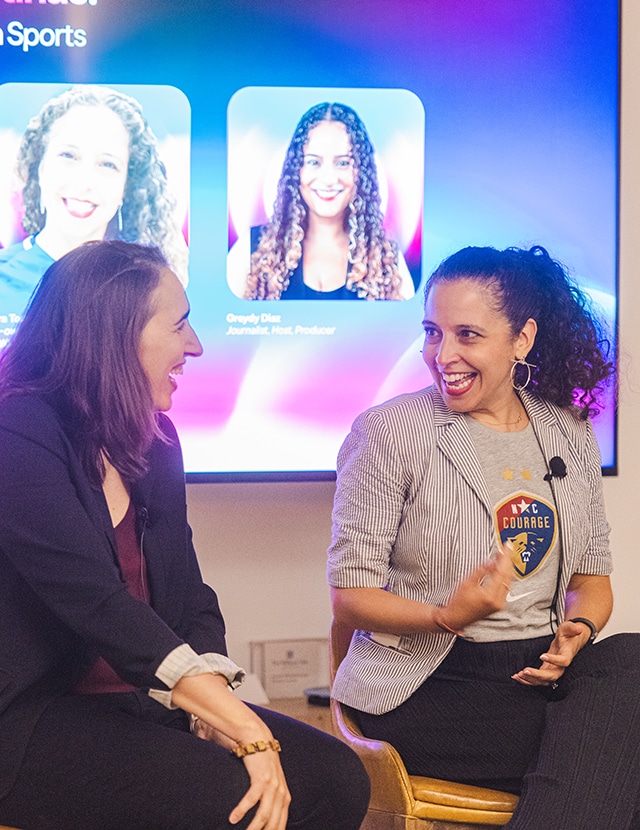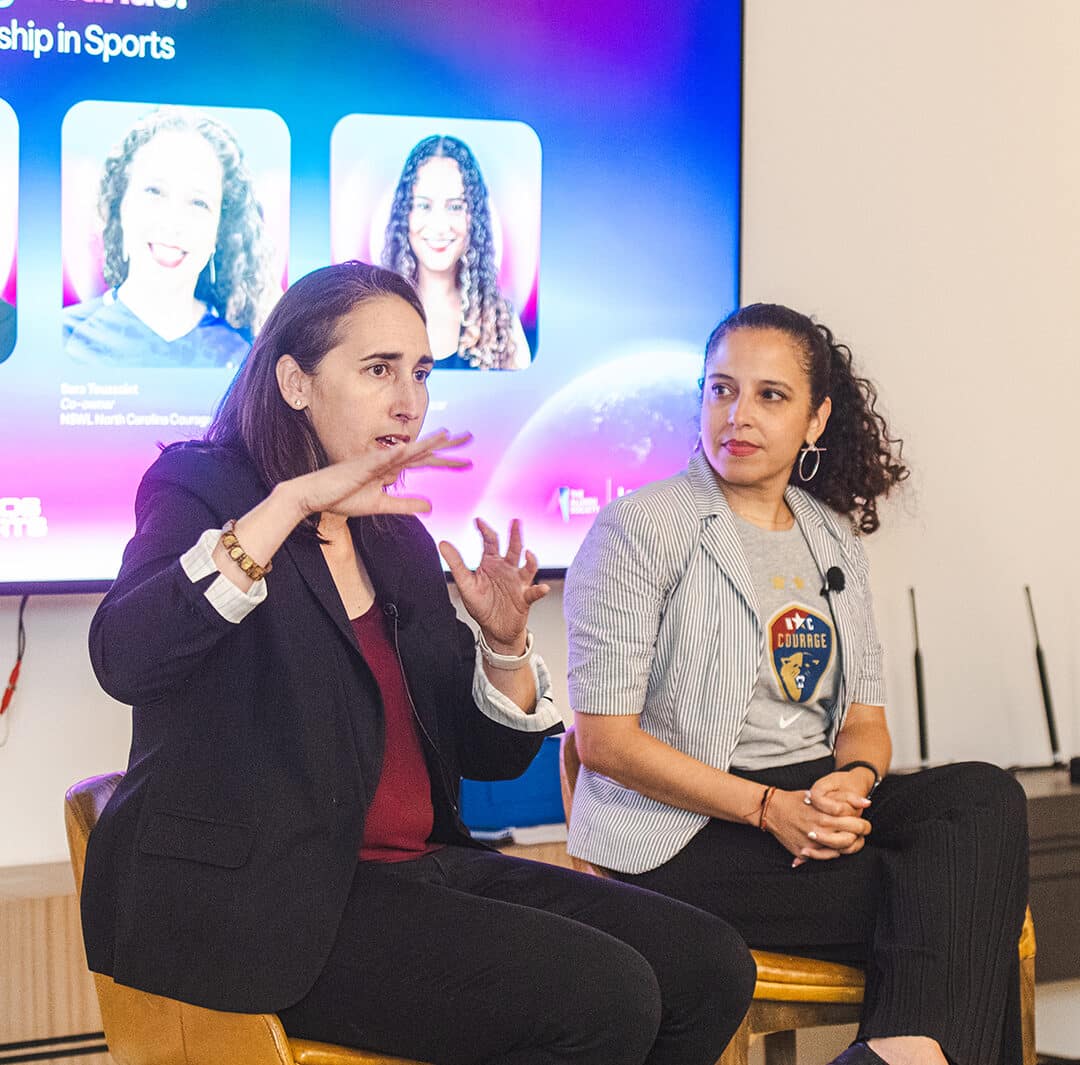In the vibrant yet challenging world of sports, Latina leaders are breaking barriers and redefining the sports leadership playbook.
Ann Rodriguez and Sara Toussaint are two such leaders.
Rodriguez, senior advisor at McKinsey & Co., is a strategic business leader with over twenty years of experience in the sports industry, known for driving growth and scaling high-profile global brands. She’s led the creation of Atlanta United FC and served as chief operating officer of the WNBA and chief strategy and people officer for the 2028 Summer Olympics.
Also a twenty-year veteran of the sports industry, Toussaint is a partner at Underdog Venture Team, a social impact enterprise providing marketing services to the sports and entertainment industries and investing in underrepresented founders. She serves on the corporate board of Hispanic-owned athlete agency TMJ, co-owns the North Carolina Courage of the National Women’s Soccer League, and is a founding board member of Latinx in Sports.
Both Latinas took the stage at the Alumni Society’s Leadership Summit 2024 with sports journalist Greydy Diaz to share their experiences in the industry through compelling stories and invaluable advice. From their conversation, we’ve found five leadership lessons for Latinas looking to make their own impact in sports.

1. Embrace your authentic self.
Bring your Latina identity to the table confidently. Show up as who you are and be honest.
Latinas, Rodriguez says, tell the truth when something isn’t working. “We get to answers efficiently that way,” she explains. “It’s just really leaning into that fierce truth-teller aspect of our culture.”
When Toussaint joined Major League Baseball in 2004, her initial strategy was to get to know the white men in the office, learn from them, and show them her potential. But they didn’t want anything to do with her. “I was like, ‘Forget you all.’ Not that I was pretending, but that wasn’t really my space,” she says. “I [knew I needed] to find a place that values me for me and not try to fit in somewhere.”
Then, use your authenticity to open doors and create opportunities. Toussaint notes that even though she took her husband’s name, she makes sure that she is speaking Spanish whenever she can and letting people know about her Latina culture. This is what led to her joining Major League Soccer. “From that, I learned that I should always embrace my experiences and my culture.”
2. Build and leverage strong networks.
Actively create and use support systems such as networks and affinity groups. Forge relationships that provide guidance, support, and new opportunities.
Toussaint makes decisions with her gut, but she leans on the support of her network and her personal board of directors whenever she makes a big move or is thinking about making a big move.
Rodriguez also relies on her network. “We all have our all-star team of people we’d want to work with again, or people you’d want to work with that you know but never worked with,” she says.
And engage with communities like Latinos in Sports to boost your career growth. “Use this as a forum to meet more people. For every person who brings you, you bring the next person,” Rodriguez emphasizes. “We’re just at a point where we all have a lot of responsibility now.
“It’s just really leaning into that fierce truth-teller aspect of our culture.”
Ann Rodriguez
3. Embrace diverse career paths and experiences.
Leverage a variety of roles and industries to build a well-rounded perspective and skill set. Use your diverse experiences as an asset in navigating and excelling in the sports industry.
Toussaint worked in the athletics department at the University of Chicago, but sports wasn’t something she thought could be a career. Being a lawyer certainly wasn’t for her, she notes. It was a move to New York that led her join Major League Baseball. From there she “zigzagged” her career in sports, and eventually followed her gut feeling that women’s sports was going to take off. “I just thought, there’s an opportunity. I have to figure out a way to get in,” she says of her path toward investing in and co-owning the North Carolina Courage.
Rodriguez jokes that like anyone in the sports industry, she earned a degree in ecology and evolutionary biology at Princeton with the goal of being a marine biologist. But really, it was her time playing lacrosse at Princeton and working at a lacrosse specialty store that cracked open the door for pursuing sports after graduation.
“I got the advice: you got to start. You got to get some experience,” she says. “I actually started my career at the Women’s World Cup in 1999, which at the time was the largest women’s sporting event in the history of the world. I started there and haven’t looked back.”

4. Engage effectively with the community.
Connect authentically with the community, understand their needs, and participate in grassroots events. Use effective community engagement to drive meaningful outcomes and garner strong support for sports initiatives.
This was the key to bringing a soccer team to Atlanta. “We actually didn’t spend a lot of outbound money on marketing,” says Rodriguez, who was vice president of business operations for Atlanta United FC from 2015 to 2017. “It was a lot more on showing up within the community and their organic events that were already happening. Then figuring out how we could be a part of that, versus the other way around.”
5. Navigate corporate and board roles with insight.
To find board opportunities, you must network purposefully, build your professional expertise, and do your homework on the companies. Understand the core business and the responsibilities of corporate and nonprofit boards.Your professional expertise is an asset, regardless of which board you sit on.
Rodriguez holds varying degrees of influence across her different board seats. At USA Lacrosse, she is on the governance and executive committees and is able to help chart the future of the organization.
Then at the Princeton Varsity Club, her role is to help advise the athletic director John Mack, who is one of the only Black athletic directors in Division One and a friend of hers from when they were athletes together. The board is a mix of alumni from different generations, including those who attended Princeton before it became co-ed.
“We’re making decisions around women’s sports or with people who went to school before it was really integrated men and women,” she says. “That’s a really interesting way of contemplating our legacy, contemplating our role within the Ivy League, contemplating our role within that rapidly changing NCAA landscape.”
—
These insights were shared onstage with journalist Greydy Diaz at the Alumni Society’s Leadership Summit 2024, which was held in Brooklyn, New York, on June 13. This article was written with the assistance of AI.
